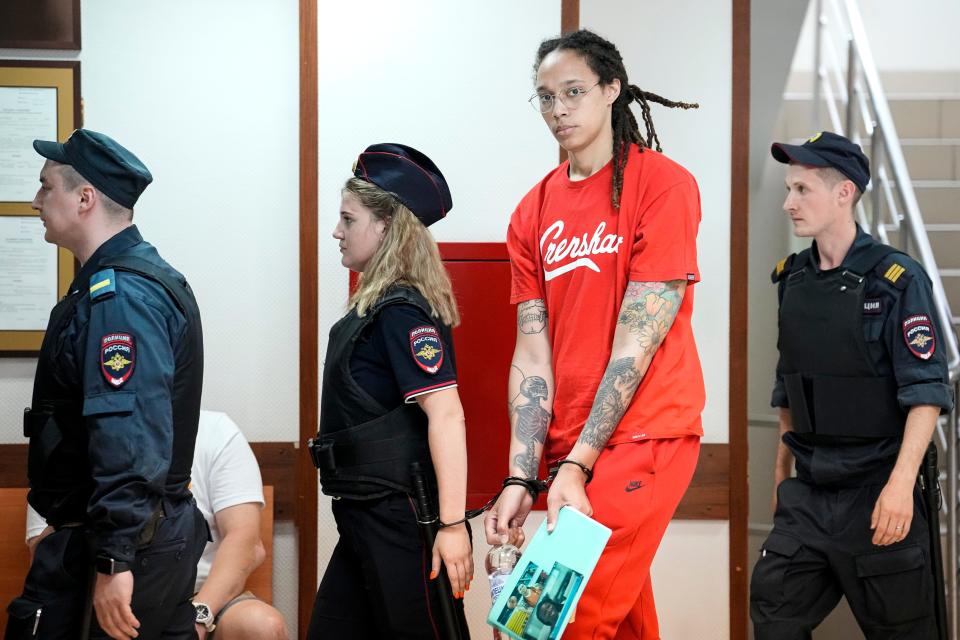WNBA's Brittney Griner deserves our support as she sits in a Russian jail cell
WNBA superstar Brittney Griner is imprisoned in Russia, and the public silence has been deafening. It’s hard to imagine a male athlete with Griner’s record – a seven-time All-Star player and two-time Olympic gold medalist holding mind-boggling records in dunks and blocked shots – sitting for months in a Russian prison.
A letter from Griner was recently delivered to President Joe Biden, appealing for help: "As I sit here in a Russian prison, alone with my thoughts and without the protection of my wife, family, friends, Olympic jersey, or any accomplishments, I’m terrified I might be here forever.”
Many WNBA fans have wondered: What if, instead, an NBA champion had been wrongfully detained? The same question was pondered by Griner's coach, Vanessa Nygaard.

'Say her name': As free Brittney Griner movement gains momentum, is it enough to get her home?
It’s not Griner’s gender but rather the circumstances of her arrest inviting silence if not outright hostility from the American public. When Americans are taken hostage by foreign governments, silence can be a good strategy. But in Griner’s case, it showcases our biases – and weakens efforts to bring her home.
In February, the Olympian was detained by Russian authorities, who allegedly found a vape cartridge with hashish oil in her luggage. Griner has been accused of transporting illegal narcotics and could be sentenced up to 10 years in Russian prison.
Secretary-general of the U.N.: These five steps will help us kick our fossil fuel addiction and save the planet
On Thursday, she pleaded guilty to drug charges in a Russian court: "I'd like to plead guilty, your honor. But there was no intent. I didn't want to break the law."
'Understated, if not hostile'
In the weeks after Griner’s arrest, the world heard little of her ordeal as Russia launched an invasion of Ukraine.
If Russian President Vladimir Putin intended to hold Griner hostage, the logic went, he would want to evaluate how much she was worth. More attention could mean a higher price in a deal to bring her home.
However, as criminal justice gave way to farce, Griner’s circle has broken their silence. While Russian media float a potential prisoner exchange, Griner’s supporters launched a Change.org petition to press the White House to negotiate her release. The WNBA paid tribute to Griner on all home courts. The Boston Celtics wore "WE ARE BG" shirts to practice during the NBA finals. Several star players – including Stephen Curry, Carmelo Anthony and LeBron James – have used their platforms to advocate for her freedom.
'I was shot': Talking to survivors of the Highland Park shooting left me humbled
The reaction to this campaign has been understated, if not hostile. As of Thursday, more than 300,000 people have signed the online petition calling for Griner’s release. This sounds like a lot, until you compare it with over 270,000 opposing chicken abuse or more than 400,000 supporting males wearing nail polish in school. Over 536,000 signed a petition to release Washington Post journalist Jason Rezaian from Iranian prison.
Moreover, some online responses have been negative, arguing that because Griner (allegedly) broke a law, she should be punished.
Who deserves sympathy?
What explains the surprisingly muted – and in some cases negative – response to Griner’s plight? In short, Americans deem some hostages “bad victims,” unworthy of government support.

First, the media sees some victims as more newsworthy than others. Griner is a record-breaking, all-star athlete, but she’s also Black, gay and gender nonconforming. Research shows some of these traits could make her far less likely to receive the same attention that another victim might. A theory known as the "missing white woman syndrome" suggests that white, female hostages are far more likely to receive attention than their nonwhite counterparts.
Suzette Hackney: Jayland Walker left his gun in the car. Then Akron police shot him 60 times.
Second, the American public sees some victims as more deserving than others. Deservingness is the notion that how someone came to require help is an important determinant for whether she should receive it.
In ongoing research, Lauren Prather and I show that the deservingness heuristic explains support for hostage recovery efforts. The government must expend resources to bring hostages home through prisoner exchanges, ransom payments or rescue missions – risking votes, treasure and lives. American citizens vary in the extent to which they believe that hostages used poor judgment or were simply unlucky in getting captured.
Those Americans who believe that hostages are responsible for the circumstances of their captivity are less likely to deem those hostages worthy of recovery – and are therefore more likely to oppose government efforts to bring the hostage home.
This research may shed light on the seemingly underwhelming response to the WE ARE BG movement. Despite lacking any credible evidence that Griner was transporting narcotics, some Americans are quick to say that she broke a law. Some question Griner’s judgment in traveling to Russia at a time of increasing international tensions. To those holding such views, Griner deserves to be punished – not helped – for her personal responsibility in being detained by an autocratic state.
Fix the Supreme Court: Don't blame justices for behaving as expected
On Wednesday, President Joe Biden spoke by phone with Cherelle Griner, the WNBA star's wife, and read her a letter that he plans to send the basketball player while she remains detained in Russia.
"The president called Cherelle to reassure her that he is working to secure Brittney’s release as soon as possible," the White House said in a statement that also singled out Biden's efforts to bring home Paul Whelan and other U.S. nationals "wrongfully detained or held hostage" in Russia. "He also read her a draft of the letter the president is sending to Brittney Griner today."
The White House would not disclose what Biden's letter says.
If the goal of advocacy campaigns is to pressure the Biden administration to act, more public support for deserving victims should translate to more public pressure. The tendency to blame Griner and other detainees for their circumstances will only make that harder.

Danielle Gilbert is a Rosenwald Fellow in U.S. Foreign Policy and International Security at the John Sloan Dickey Center for International Understanding at Dartmouth College. Follow her on Twitter: @_danigilbert
You can read diverse opinions from our Board of Contributors and other writers on the Opinion front page, on Twitter @usatodayopinion and in our daily Opinion newsletter. To respond to a column, submit a comment to letters@usatoday.com.
This article originally appeared on USA TODAY: Brittney Griner is languishing in Russian prison. America should care.

 Yahoo Sports
Yahoo Sports 